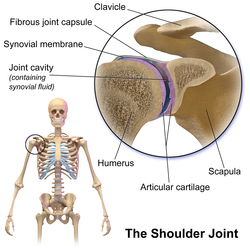Postarthroscopic glenohumeral chondrolysis

Editor-In-Chief: Prab R Tumpati, MD
Obesity, Sleep & Internal medicine
Founder, WikiMD Wellnesspedia &
W8MD medical weight loss NYC and sleep center NYC
| Postarthroscopic glenohumeral chondrolysis | |
|---|---|

| |
| Synonyms | PAGCL |
| Pronounce | N/A |
| Specialty | Orthopedic surgery |
| Symptoms | Shoulder pain, stiffness, loss of motion |
| Complications | Osteoarthritis |
| Onset | Post-surgical |
| Duration | Chronic |
| Types | N/A |
| Causes | Arthroscopic surgery complications |
| Risks | Use of intra-articular pain pumps |
| Diagnosis | Clinical examination, MRI, X-ray |
| Differential diagnosis | Osteoarthritis, Rotator cuff tear |
| Prevention | Avoidance of certain pain management techniques |
| Treatment | Physical therapy, NSAIDs, surgery |
| Medication | N/A |
| Prognosis | Variable, often poor without intervention |
| Frequency | Rare |
| Deaths | N/A |
A condition involving cartilage damage in the shoulder joint following arthroscopic surgery
Postarthroscopic glenohumeral chondrolysis (PAGCL) is a rare but serious condition characterized by the rapid degeneration of the articular cartilage in the glenohumeral joint following arthroscopic surgery. This condition can lead to significant pain, stiffness, and loss of function in the affected shoulder.
Pathophysiology[edit]
The glenohumeral joint is a ball-and-socket joint formed by the articulation of the humeral head and the glenoid fossa of the scapula. The joint is lined with articular cartilage, which provides a smooth, lubricated surface for joint movement. In PAGCL, this cartilage is rapidly destroyed, leading to exposure of the underlying bone and severe joint dysfunction. The exact mechanism of PAGCL is not fully understood, but it is believed to be associated with the use of intra-articular pain pumps that deliver local anesthetics directly into the joint space. These anesthetics, particularly those containing bupivacaine with epinephrine, have been implicated in chondrolysis due to their toxic effects on cartilage cells.
Clinical Presentation[edit]
Patients with PAGCL typically present with increasing shoulder pain, stiffness, and decreased range of motion following an arthroscopic procedure. Symptoms may develop weeks to months after surgery. On physical examination, there may be tenderness over the joint, crepitus, and significant limitation in both active and passive range of motion.
Diagnosis[edit]
The diagnosis of PAGCL is primarily clinical, supported by imaging studies. Magnetic resonance imaging (MRI) of the shoulder may show loss of cartilage thickness, subchondral bone changes, and joint effusion. X-rays may reveal joint space narrowing and osteophyte formation in advanced cases.
Management[edit]
Management of PAGCL is challenging and focuses on symptom relief and preservation of joint function. Initial treatment may include nonsteroidal anti-inflammatory drugs (NSAIDs), physical therapy, and activity modification. In severe cases, surgical intervention such as arthroscopic debridement, microfracture surgery, or even shoulder arthroplasty may be necessary.
Prevention[edit]
Preventive measures are crucial to reduce the risk of PAGCL. Surgeons are advised to avoid the use of intra-articular pain pumps with potentially chondrotoxic anesthetics. Alternative pain management strategies, such as regional nerve blocks or systemic analgesics, should be considered.
Prognosis[edit]
The prognosis of PAGCL varies depending on the severity of cartilage damage and the effectiveness of treatment. Early diagnosis and intervention can improve outcomes, but many patients may experience persistent pain and functional limitations.
See also[edit]
Ad. Transform your life with W8MD's Budget GLP-1 injections from $75


W8MD offers a medical weight loss program to lose weight in Philadelphia. Our physician-supervised medical weight loss provides:
- Weight loss injections in NYC (generic and brand names):
- Zepbound / Mounjaro, Wegovy / Ozempic, Saxenda
- Most insurances accepted or discounted self-pay rates. We will obtain insurance prior authorizations if needed.
- Generic GLP1 weight loss injections from $75 for the starting dose.
- Also offer prescription weight loss medications including Phentermine, Qsymia, Diethylpropion, Contrave etc.
NYC weight loss doctor appointmentsNYC weight loss doctor appointments
Start your NYC weight loss journey today at our NYC medical weight loss and Philadelphia medical weight loss clinics.
- Call 718-946-5500 to lose weight in NYC or for medical weight loss in Philadelphia 215-676-2334.
- Tags:NYC medical weight loss, Philadelphia lose weight Zepbound NYC, Budget GLP1 weight loss injections, Wegovy Philadelphia, Wegovy NYC, Philadelphia medical weight loss, Brookly weight loss and Wegovy NYC
|
WikiMD's Wellness Encyclopedia |
| Let Food Be Thy Medicine Medicine Thy Food - Hippocrates |
Medical Disclaimer: WikiMD is not a substitute for professional medical advice. The information on WikiMD is provided as an information resource only, may be incorrect, outdated or misleading, and is not to be used or relied on for any diagnostic or treatment purposes. Please consult your health care provider before making any healthcare decisions or for guidance about a specific medical condition. WikiMD expressly disclaims responsibility, and shall have no liability, for any damages, loss, injury, or liability whatsoever suffered as a result of your reliance on the information contained in this site. By visiting this site you agree to the foregoing terms and conditions, which may from time to time be changed or supplemented by WikiMD. If you do not agree to the foregoing terms and conditions, you should not enter or use this site. See full disclaimer.
Credits:Most images are courtesy of Wikimedia commons, and templates, categories Wikipedia, licensed under CC BY SA or similar.
Translate this page: - East Asian
中文,
日本,
한국어,
South Asian
हिन्दी,
தமிழ்,
తెలుగు,
Urdu,
ಕನ್ನಡ,
Southeast Asian
Indonesian,
Vietnamese,
Thai,
မြန်မာဘာသာ,
বাংলা
European
español,
Deutsch,
français,
Greek,
português do Brasil,
polski,
română,
русский,
Nederlands,
norsk,
svenska,
suomi,
Italian
Middle Eastern & African
عربى,
Turkish,
Persian,
Hebrew,
Afrikaans,
isiZulu,
Kiswahili,
Other
Bulgarian,
Hungarian,
Czech,
Swedish,
മലയാളം,
मराठी,
ਪੰਜਾਬੀ,
ગુજરાતી,
Portuguese,
Ukrainian